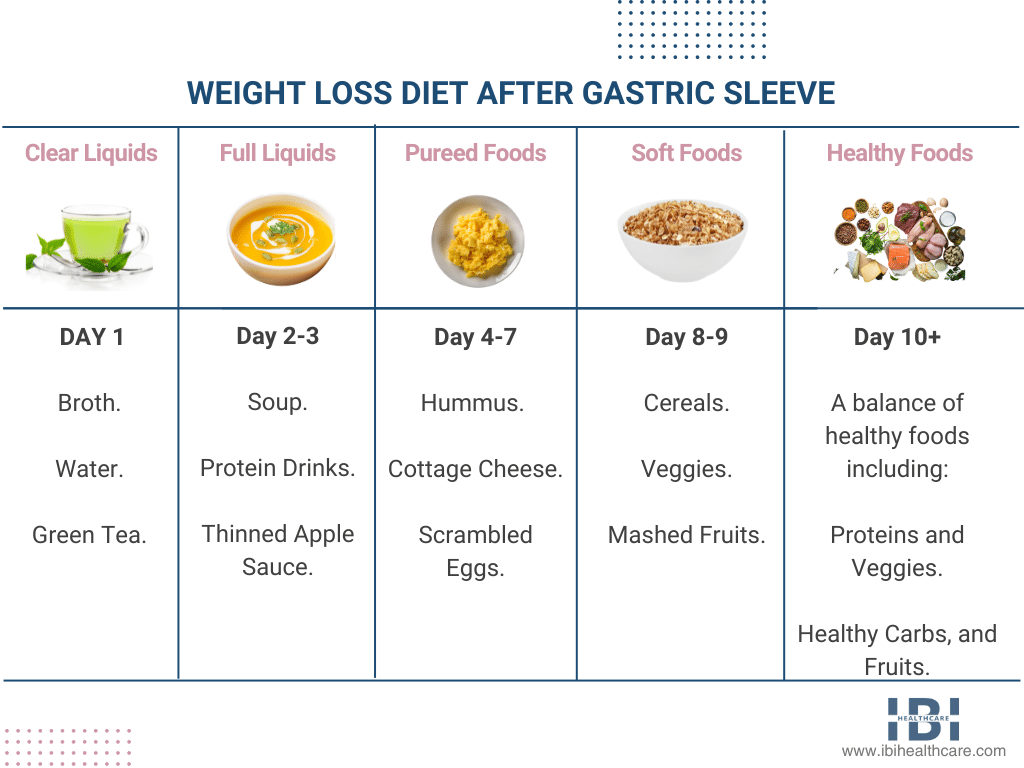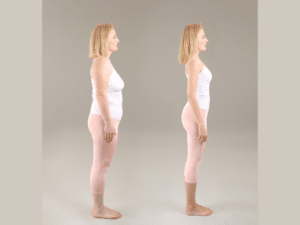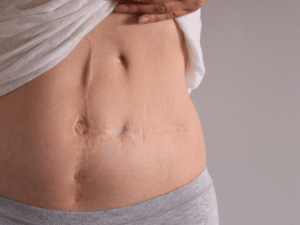After undergoing Bariatric Surgery such as gastric sleeve surgery, patients normally lose a significant amount of weight and this typically happens very quickly. It is not unusual for patients to regain some of this rapidly lost weight but if the regain is substantial, or continues, it can sabotage all previous efforts. Today, we will discuss the causes of weight regain after bariatric surgery, how to stop it, and how to restart weight loss after gastric sleeve surgery or any other bariatric procedure.
First Let’s Look at How Gastric Sleeve Surgery Works
Before undergoing Bariatric Sleeve Surgery, patients are put on a very restrictive diet to help shrink their liver and then move to an all-liquid diet for a few days just before the procedure.
Gastric sleeve surgery reduces the stomach’s capacity to about 25%. Eating less and slower digestion are advantages. The procedure also reduces Ghrelin, the hunger hormone. Having Ghrelin’s incessant nagging quieted helps many patients avoid in-between-meal snacking and consuming too many calories in a day.
After gastric sleeve surgery, you must follow a special diet to give the stomach time to heal and maintain a healthy diet forever to manage your weight.
The combination of the time needed for the stomach to heal, the smaller stomach size, and the “all liquid” diet the patient must follow right after bariatric surgery translates into rapid weight loss.
What Causes Weight Regain after Gastric Sleeve Surgery?
The main reason patients regain weight after bariatric surgery is that they are not diligent in sticking to the lifestyle changes necessary to maintain their weight loss. This means small portions of healthy foods, the recommended amount of physical exercise, adequate sleep, etc. Many factors can contribute to patients regaining weight after weight loss surgery such as:
- Stress.
- Phycological Issues.
- Lack of Motivation.
- Metabolic Issues – Sometimes the patient’s body metabolism begins to work against them and slows down in response to the lower caloric intake.
Can Your Stomach Get Bigger If You Eat Too Much?
Many people believe that the human stomach can stretch out and can permanently become a bigger size, allowing them to overeat and gain weight but this is not exactly the way it works.
Our stomachs get a signal from our brains that food is on the way and a process called gastric accommodation happens. The muscles (rugae) that allow the stomach to expand after we consume foods or liquids relax so the stomach can expand to accommodate the incoming food. Most human stomachs can stretch to be 5x bigger than their “fasting” or normal size. After digestion, the stomach returns to the fasting size. The stomach itself does not get any bigger, the element that changes is the amount of elasticity (distensibility) the stomach has. How much capacity do our stomachs have when they relax?
Scientific studies have discovered that eating habits and patterns have a profound effect on stomach elasticity. Individuals who consume excessively have increased elasticity over those who consume less food. A Mayo Clinic Report concluded that an individual’s gastric capacity was linked more to eating behavior than to body weight after studying patients who suffer from bulimia and discovering their extremely high gastric capacity.
Another study from 1996 placed 1000 individuals with a higher weight on a 1000-calorie diet for 30 days and their gastric capacity was reduced by an average of 36%.
Can You Reset Your Pouch After Gastric Sleeve Surgery?
Anecdotal examples that are floating around that describe “how to reset your gastric pouch” in just 5 or 10 days, etc. Can an individual do “a pouch reset”?
This question has been circulating since 2007 when a former bariatric patient wrote about her experience of getting back on track after experiencing weight regain after losing it as a result of weight loss surgery. She gave an example of a diet plan to follow for 5 days that would “reset your gastric pouch” meaning, it would provide that initial very restricted feeling experienced immediately after surgery.
Bariatric specialists have said that the initial “very restricted” feeling experienced directly after bariatric surgery is due to the swelling and inflammation caused by the surgery. Eventually, the stomach heals and begins to function normally again. Stretching to accommodate food, and retracting after digestion.
These specialists agree that most patients regain weight after bariatric surgery because of what they eat, the timing of when they eat, how they eat (their meal environment), and snacking between meals (this includes beverages) and not because they have stretched out their stomachs.
How is The Pouch Reset Supposed to Work?
Depending on where you are getting the information, the pouch reset appears to be a very restricted diet that runs from 5 to 10 days. The suggested diet is very similar to what most bariatric patients experience immediately after surgery to ease the stomach back into doing its job after reducing its size.
The suggested diet looks something like this:

Does The Pouch Reset Work?
Here are some facts supplied by bariatric nutrition experts:
- The proposed 5-10 day pouch reset diets will NOT shrink your stomach, reset’ your metabolism, curb hunger make you feel full longer, or stop food cravings.
- Bariatric dietitians agree that a 5-day pouch test is simply a 5-day diet that may shed some pounds but will not accomplish all it professes.
Truths Found in the 5-Day Pouch Reset Diet
Some of the suggestions that are included in these proposed diets are factual. They are the very same tips and guidelines provided by the bariatric surgeon for patients to follow after surgery to help them effectively lose weight and keep it off. These tips include:
1. Eat Slowly and with Purpose
Chew food slowly to prevent overeating and aid weight loss efforts. This will allow time for the brain to acknowledge the intake of food and register satisfaction.
2. Always Separate Fluids from Meals
Wait 30 minutes before/after meals for drinks after weight loss surgery. Eat right to stay healthy, and avoid flushing food too fast.
3. Eat Foods in the Correct Order with Protein First
High-protein foods are critical in keeping the body functioning properly. Due to reduced stomach capacity, include protein in meals. Eating it first ensures proper intake despite smaller portions.
4. Limit The Use Of Slider Foods
Protein shakes are nutritious, but may not create a full feeling due to fast digestion.
So The Question Becomes Can You Restart Weight Regain After Gastric Sleeve Surgery?
The answer is yes, you can. Restart weight loss after gastric sleeve surgery with 4 important steps. Overcome weight regain or plateau after gastric sleeve surgery. Take these 4 steps.
4 Steps to Take Immediately to Restart Weight Loss After Gastric Sleeve Surgery
- First, commit yourself that you are in this for the long haul and you will not quit. Even if you slip up, get back up and keep going.
- Then, call and set up a consultation with your bariatric surgeon to explore all factors contributing to weight gain. The professionals at the bariatric center will help point you in the right direction to get back on track.
- You may be eligible for a bariatric revision through ESG. Endoscopic Sleeve Gastroplasty is a non-surgical procedure. That is performed to tighten up the original surgery so it becomes greatly restrictive again.
- You may be a candidate for weight loss medication such as SlimMed, Wegovy, or Saxenda. That can help you make a weight loss breakthrough and facilitate ongoing weight loss.
- You may be eligible for a bariatric revision through ESG. Endoscopic Sleeve Gastroplasty is a non-surgical procedure. That is performed to tighten up the original surgery so it becomes greatly restrictive again.
- Next, modify your lifestyle and behavior immediately to reflect what you were doing directly after your bariatric surgery. This would include strictly following the post-bariatric diet and exercise plans, getting adequate sleep, and water intake.
- Finally, assemble or reassemble a support team of friends, family, or like-minded individuals to talk with or learn from. Many online groups are available that help support each other through weight loss. Some of them meet in person and participate in activities together that are fun and provide physical exercise.
Weight Loss After Gastric Sleeve Surgery Requires A Long-term Lifestyle Change
Unfortunately, when it comes to long-term weight loss there are no shortcuts. No 5 or 10-day solution can do a “pouch reset” and solve all our weight loss issues. To change gastric capacity, alter eating habits over around 30 days (study from 1996). No scientific evidence supports “pouch reset” or “5-day pouch test.”
However, your determination and lifestyle changes are key to long-term weight loss success. The number one reason patients regain weight is due to recurring, unhealthy eating habits, or a sedentary lifestyle. Keeping weight off requires a lifetime commitment and support from professionals, friends, family, and groups.
If you have undergone bariatric surgery and are experiencing weight regain please contact IBI Healthcare Institute for a consultation. Caring professionals at IBI Healthcare help you live your best life. We’re here for your weight loss journey. Contact us today to find the best available weight loss options for you.











